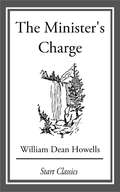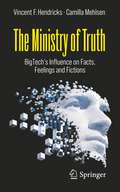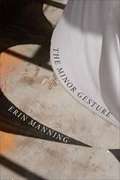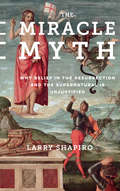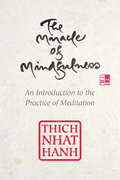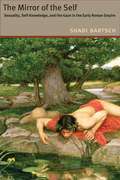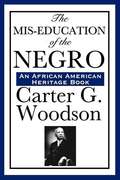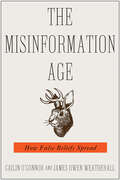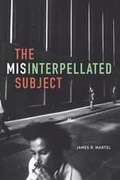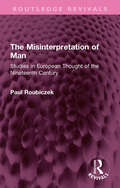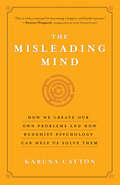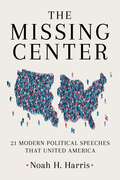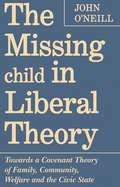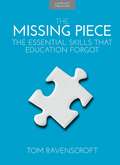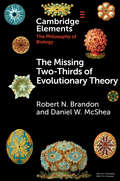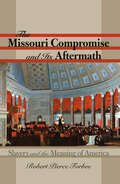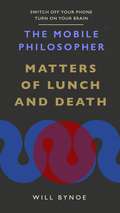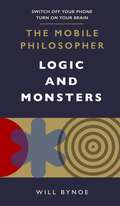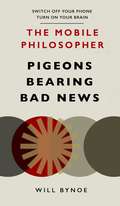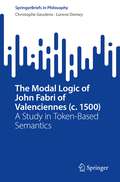- Table View
- List View
The Minister's Charge: The Apprenticeship of Lemuel Barker
by William Dean HowellsWilliam Dean Howells (1837-1920) was an American realist author and literary critic. He wrote his first novel, Their Wedding Journey, in 1871, but his literary reputation really took off with the realist novel A Modern Instance, published in 1882, which describes the decay of a marriage. His 1885 novel The Rise of Silas Lapham is perhaps his best known, describing the rise and fall of an American entrepreneur in the paint business. His social views were also strongly reflected in the novels Annie Kilburn (1888) and A Hazard of New Fortunes (1890). While known primarily as a novelist, his short story "Editha" (1905) - included in the collection Between the Dark and the Daylight (1907) - appears in many anthologies of American literature. Howells also wrote plays, criticism, and essays about contemporary literary figures such as Ibsen, Zola, Verga, and, especially, Tolstoy, which helped establish their reputations in the United States. He also wrote critically in support of many American writers. It is perhaps in this role that he had his greatest influence.
The Ministry of Truth: BigTech's Influence on Facts, Feelings and Fictions
by Vincent F. Hendricks Camilla MehlsenThe Ministry of Truth scrutinizes the information market in the era of the attention economy calling on citizens, public educators and politicians to action in averting the role of BigTech in critical infrastructure. Through phenomena such as influencers, ‘fake news’, and covid conspiracies, the authors reveal how social platforms control facts, feelings and narratives in our time to such a degree that they are the de facto arbiters of truth. BigTech seemingly controls the information infrastructure and also decides what we pay attention to. The authors suggest hope for a more democratic internet through their systematic analysis of the largest players of the information age. The aim is to amplify human agency for a robust deliberative democracy — not version 2.0 — but a lasting version with staying power. This book appeals to the general interest reader and professional invested in the mobilization of responsible technological development.Vincent F. Hendricks is Professor of Formal Philosophy at The University of Copenhagen. He is Director of the Center for Information and Bubble Studies (CIBS) funded by the Carlsberg Foundation.Camilla Mehlsen is Digital Media Expert and Spokesperson for the Danish child organization Children’s Welfare. She is author of several books on digital literacy and her work on digital media has been published in various newspapers and magazines.
The Minor Gesture
by Erin ManningIn this wide-ranging and probing book Erin Manning extends her previous inquiries into the politics of movement to the concept of the minor gesture. The minor gesture, although it may pass almost unperceived, transforms the field of relations. More than a chance variation, less than a volition, it requires rethinking common assumptions about human agency and political action. To embrace the minor gesture's power to fashion relations, its capacity to open new modes of experience and manners of expression, is to challenge the ways in which the neurotypical image of the human devalues alternative ways of being moved by and moving through the world--in particular what Manning terms "autistic perception." Drawing on Deleuze and Guattari's schizoanalysis and Whitehead's speculative pragmatism, Manning's far-reaching analyses range from fashion to depression to the writings of autistics, in each case affirming the neurodiversity of the minor and the alternative politics it gestures toward.
The Miracle Myth: Why Belief in the Resurrection and the Supernatural Is Unjustified
by Lawrence ShapiroThere are many who believe Moses parted the Red Sea and Jesus came back from the dead. Others are certain that exorcisms occur, ghosts haunt attics, and the blessed can cure the terminally ill. Though miracles are immensely improbable, people have embraced them for millennia, seeing in them proof of a supernatural world that resists scientific explanation.Helping us to think more critically about our belief in the improbable, The Miracle Myth casts a skeptical eye on attempts to justify belief in the supernatural, laying bare the fallacies that such attempts commit. Through arguments and accessible analysis, Larry Shapiro sharpens our critical faculties so we become less susceptible to tales of myths and miracles and learn how, ultimately, to evaluate claims regarding vastly improbable events on our own. Shapiro acknowledges that belief in miracles could be harmless, but cautions against allowing such beliefs to guide how we live our lives. His investigation reminds us of the importance of evidence and rational thinking as we explore the unknown.
The Miracle of Mindfulness, Gift Edition
by Thich Nhat HanhA new gift edition of the classic guide to meditation and mindfulness, featuring archival photography and beautiful calligraphy by Thich Nhat HanhSince its publication in 1975, The Miracle of Mindfulness has been cherished by generations of readers for its eloquent and useful introduction to the practice of meditation. Readers interested in an introduction to Buddhist thought, as well as those seeking to learn about mindfulness and stress reduction, continue to look to Thich Nhat Hanh's classic work for guidance and inspiration. This new hardcover gift edition features elegant calligraphic illustrations by Thich Nhat Hanh, as well as a dozen photographs spanning his early days as a peace activist to his life in Plum Village, a spiritual community that he founded in France. Also included in this edition is a historical chronology of Thich Nhat Hanh's life and work, and a revised afterword by Jim Forest.
The Mirror of the Self: Sexuality, Self-Knowledge, and the Gaze in the Early Roman Empire
by Shadi BartschPeople in the ancient world thought of vision as both an ethical tool and a tactile sense, akin to touch. Gazing upon someone—or oneself—was treated as a path to philosophical self-knowledge, but the question of tactility introduced an erotic element as well. In The Mirror of the Self, Shadi Bartsch asserts that these links among vision, sexuality, and self-knowledge are key to the classical understanding of the self. Weaving together literary theory, philosophy, and social history, Bartsch traces this complex notion of self from Plato’s Greece to Seneca’s Rome. She starts by showing how ancient authors envisioned the mirror as both a tool for ethical self-improvement and, paradoxically, a sign of erotic self-indulgence. Her reading of the Phaedrus, for example, demonstrates that the mirroring gaze in Plato, because of its sexual possibilities, could not be adopted by Roman philosophers and their students. Bartsch goes on to examine the Roman treatment of the ethical and sexual gaze, and she traces how self-knowledge, the philosopher’s body, and the performance of virtue all played a role in shaping the Roman understanding of the nature of selfhood. Culminating in a profoundly original reading of Medea, The Mirror of the Self illustrates how Seneca, in his Stoic quest for self-knowledge, embodies the Roman view, marking a new point in human thought about self-perception. Bartsch leads readers on a journey that unveils divided selves, moral hypocrisy, and lustful Stoics—and offers fresh insights about seminal works. At once sexy and philosophical, The Mirror of the Self will be required reading for classicists, philosophers, and anthropologists alike.
The Mis-Education of the Negro
by Carter G. WoodsonThe Mis-Education of the Negro is one of the most important books on education ever written. Carter G. Woodson shows us the weakness of Euro-centric based curriculums that fail to include African American history and culture. This system mis-educates the African American student, failing to prepare them for success and to give them an adequate sense of who they are within the system that they must live. Woodson provides many strong solutions to the problems he identifies. A must-read for anyone working in the education field.
The Misinformation Age: How False Beliefs Spread
by James Owen Weatherall Cailin O'Connor“Empowering and thoroughly researched, this book offers useful contemporary analysis and possible solutions to one of the greatest threats to democracy.” —Kirkus ReviewsEditors’ choice, The New York Times Book ReviewRecommended reading, Scientific AmericanWhy should we care about having true beliefs? And why do demonstrably false beliefs persist and spread despite bad, even fatal, consequences for the people who hold them?Philosophers of science Cailin O’Connor and James Weatherall argue that social factors, rather than individual psychology, are what’s essential to understanding the spread and persistence of false beliefs. It might seem that there’s an obvious reason that true beliefs matter: false beliefs will hurt you. But if that’s right, then why is it (apparently) irrelevant to many people whether they believe true things or not?The Misinformation Age, written for a political era riven by “fake news,” “alternative facts,” and disputes over the validity of everything from climate change to the size of inauguration crowds, shows convincingly that what you believe depends on who you know. If social forces explain the persistence of false belief, we must understand how those forces work in order to fight misinformation effectively.“[The authors] deftly apply sociological models to examine how misinformation spreads among people and how scientific results get misrepresented in the public sphere.” —Andrea Gawrylewski, Scientific American“A notable new volume . . . The Misinformation Age explains systematically how facts are determined and changed—whether it is concerning the effects of vaccination on children or the Russian attack on the integrity of the electoral process.” —Roger I. Abrams, New York Journal of Books
The Misinterpellated Subject
by James R. MartelAlthough Haitian revolutionaries were not the intended audience for the Declaration of the Rights of Man, they heeded its call, demanding rights that were not meant for them. This failure of the French state to address only its desired subjects is an example of the phenomenon James R. Martel labels "misinterpellation." Complicating Althusser's famous theory, Martel explores the ways that such failures hold the potential for radical and anarchist action. In addition to the Haitian Revolution, Martel shows how the revolutionary responses by activists and anticolonial leaders to Woodrow Wilson's Fourteen Points speech and the Arab Spring sprang from misinterpellation. He also takes up misinterpellated subjects in philosophy, film, literature, and nonfiction, analyzing works by Nietzsche, Kafka, Woolf, Fanon, Ellison, Ta-Nehisi Coates, and others to demonstrate how characters who exist on the margins offer a generally unrecognized anarchist form of power and resistance. Timely and broad in scope, The Misinterpellated Subject reveals how calls by authority are inherently vulnerable to radical possibilities, thereby suggesting that all people at all times are filled with revolutionary potential.
The Misinterpretation of Man: Studies in European Thought of the Nineteenth Century (Routledge Revivals)
by Paul RoubiczekFirst published in 1949, The Misinterpretation of Man traces the deeper roots of the ideas which found their most striking and disastrous expression in German National Socialism. It attempts to show the wrong turn which European thought took during the nineteenth century and to challenge its dangerous inheritance, so as to make room for the growth of different and better ideals. The author believes that Christian tradition and values are losing their hold over a great majority of nations leading to an erosion of magnanimity and forgiveness. This book will be of interest to students of philosophy and history.
The Misleading Mind: How We Create Our Own Problems and How Buddhist Psychology Can Help Us Solve Them
by Karuna CaytonBuddhism asserts that we each have the potential to free ourselves from the prison of our problems. As practiced for more than twenty-six hundred years, the process involves working with, rather than against, our depression, anxiety, and compulsions. We do this by recognizing the habitual ways our minds perceive and react — the way they mislead. The lively exercises and inspiring real-world examples Cayton provides can help you transform intractable problems and neutralize suffering by cultivating a radically liberating self-understanding.
The Missing Center: 21 Modern Political Speeches That United America
by Noah H. Harris21 Defining Political Speeches From Presidents and Political Figures That United America in Uncertain TimesThe Missing Center is a message from the younger generation, and reminds us that shared aspirations and goals have solved America's greatest challenges and are at the heart of our greatest accomplishments to come. In American politics today there is a critical problem: partisanship. While a two-party political system has been a hallmark of the American government since the founding of our democracy, the extreme partisan politics in the 21st century is new. In a quest to find a path forward, The Missing Center showcases the transformative results that can happen when leaders govern from the center to unite, inspire and solve complex problems. We do not need to go back to the days of the Founding Fathers and only have to look at the recent past to find ideas that put the American people first. By examining speeches from presidents and leaders of both parties, we see how governing from the middle is the model that yields the best outcomes. With defining political speeches from across the aisle, from notable presidents and politicians alike, The Missing Center sheds light on how governing from the center and coming to compromise is the most effective pathway forward. In addition to commentary and context by the author, this important book includes speeches by leaders across the aisle, including: Joe BidenDonald TrumpBarack ObamaGeorge W. BushHillary ClintonElizabeth WarrenAnd More The author, Noah Harris, currently age sixteen, served as an intern for two years in the United States House of Representatives. At his age, this experience creates unique insight into the issues of the day, including how government is viewed by the next generation of voters and how to create a better future.
The Missing Child in Liberal Theory: Towards a Covenant Theory of Family, Community, Welfare and the Civic State (The Royal Society of Canada Special Publications)
by John O'NeillThe Missing Child in Liberal Theory opens public discourse on what it is Canadians hold in common through their provision of civic assurances to children and families at risk. John O'Neill presents a strongly-worded critique of the dominant discourse of the market society. He observes the link between 'duty free' capitalism and minimal civic obligations. This book calls for a covenant society where civility and reciprocity are underwritten by a second generation concept of the Canadian welfare state that will not abandon children to disastrous prospects in a market society.Confronting the current call for a leaner and meaner response to global competitiveness, O'Neill challenges concepts of liberalism and communitarianism. In their place he proposes a covenant concept of state, community, and family assurances to derive from our common provision of a civic endowment that we undertake to sustain now and for future generations of Canadians.O'Neill argues that if Canada is to survive as a national community capable of responding to the global market, we must reaffirm the civic foundations of the state. If we fail to do this, we will not have a leaner society, only a meaner one. This society will be hostile to capitalism and socialism alike. If we can rededicate the Canadian commons to the well-being of the civic person, Canada will contribute a model of survival and governance among the nations of the twenty-first century.
The Missing Piece: The Essential Skills That Education Forgot
by Tom RavenscroftThere is a fundamental gap in education. While we focus on building knowledge and securing good grades there is something missing. All of us, whatever we do, need a core set of skills which go beyond the academic - to work with others, to manage ourselves, to communicate effectively, and to creatively solve problems. We might call them different things but we draw on them as much as numeracy or literacy. Tom Ravenscroft knows them as the enterprise skills. If we need them, our students need them even more. They underpin effective learning in the classroom. They stop students dropping out at university. They are more highly valued than academic grades by employers. They are a foundation for successful entrepreneurship. They are the enablers of civic engagement and social mobility. When we look to the next decades, in a world of increased automation, fragmented jobs and the need for constant learning it is these skills that will really set our children and young people up for future success. Yet as an education system, we behave as if they cannot or should not be taught. But they can be, and they must be. Tom Ravenscroft has writen this book almost a decade after he set up Enabling Enterprise as a social enterprise. He was a secondary school teacher and the Enabling Enterprise programme was for the students in his inner-city classroom. They were not learning enough in school, and were in no sense set up for the rest of their lives. Over the last ten years, he has had the enormous privilege of leading a growing team of teachers and has worked with hundreds of classroom teachers, thousands of employer volunteers and over 200,000 students. He has seen these students build those skills with the same rigour and focus as any other academic learning. And he has seen that when they are mastered, we truly allow our students to achieve their potential.
The Missing Piece: The Essential Skills That Education Forgot
by Tom RavenscroftThere is a fundamental gap in education. While we focus on building knowledge and securing good grades there is something missing. All of us, whatever we do, need a core set of skills which go beyond the academic - to work with others, to manage ourselves, to communicate effectively, and to creatively solve problems. We might call them different things but we draw on them as much as numeracy or literacy. Tom Ravenscroft knows them as the enterprise skills. If we need them, our students need them even more. They underpin effective learning in the classroom. They stop students dropping out at university. They are more highly valued than academic grades by employers. They are a foundation for successful entrepreneurship. They are the enablers of civic engagement and social mobility. When we look to the next decades, in a world of increased automation, fragmented jobs and the need for constant learning it is these skills that will really set our children and young people up for future success. Yet as an education system, we behave as if they cannot or should not be taught. But they can be, and they must be. Tom Ravenscroft has writen this book almost a decade after he set up Enabling Enterprise as a social enterprise. He was a secondary school teacher and the Enabling Enterprise programme was for the students in his inner-city classroom. They were not learning enough in school, and were in no sense set up for the rest of their lives. Over the last ten years, he has had the enormous privilege of leading a growing team of teachers and has worked with hundreds of classroom teachers, thousands of employer volunteers and over 200,000 students. He has seen these students build those skills with the same rigour and focus as any other academic learning. And he has seen that when they are mastered, we truly allow our students to achieve their potential.
The Missing Two-Thirds of Evolutionary Theory (Elements in the Philosophy of Biology)
by Daniel W. McShea Robert BrandonIn this Element, we extend our earlier treatment of biology's first law. The law says that in any evolutionary system in which there is variation and heredity, there is a tendency for diversity and complexity to increase. The law plays the same role in biology that Newton's first law plays in physics, explaining what biological systems are expected to do when no forces act, in other words, what happens when nothing happens. Here we offer a deeper explanation of certain features of the law, develop a quantitative version of it, and explore its consequences for our understanding of diversity and complexity.
The Missouri Compromise and Its Aftermath
by Robert Pierce ForbesRobert Pierce Forbes goes behind the scenes of the crucial Missouri Compromise, the most important sectional crisis before the Civil War, to reveal the high-level deal-making, diplomacy, and deception that defused the crisis, including the central, unexpected role of President James Monroe. Although Missouri was allowed to join the union with slavery, the compromise in fact closed off nearly all remaining federal territories to slavery. When Congressman James Tallmadge of New York proposed barring slavery from the new state of Missouri, he sparked the most candid discussion of slavery ever held in Congress. The southern response quenched the surge of nationalism and confidence following the War of 1812 and inaugurated a new politics of racism and reaction. The South's rigidity on slavery made it an alluring electoral target for master political strategist Martin Van Buren, who emerged as the key architect of a new Democratic Party explicitly designed to mobilize southern unity and neutralize antislavery sentiment. Forbes's analysis reveals a surprising national consensus against slavery a generation before the Civil War, which was fractured by the controversy over Missouri.Robert Pierce Forbes goes behind the scenes of the crucial Missouri Compromise, the most important sectional crisis before the Civil War, to reveal the high-level deal-making, diplomacy, and deception that defused the crisis, including the central, unexpected role of President James Monroe. Although Missouri was allowed to join the union as a slave state, Forbes observes, the compromise in fact closed off nearly all remaining federal territory to slavery. Forbes's analysis reveals a surprising national consensus against slavery a generation before the Civil War, which was fractured by the controversy over Missouri.-->
The Mobile Philosopher: Switch off your phone, turn on your brain
by Will Bynoe· What's wrong with gluttony?· Would it be boring to live forever?· Should education prepare us for work or leisure?With a light touch, Matters of Lunch and Death distils complex philosophical thought from the ancient world to the present day into a collection of fascinating arguments on life, death, laughter and laziness.Part of the Mobile Philosopher series, this little book will inspire and provoke you, luring you away from newsfeeds and notifications to enrich your mind with deep thoughts and surprising controversies. This is mezze for the soul.
The Mobile Philosopher: Switch off your phone, turn on your brain
by Will Bynoe· Does anything happen for no reason at all?· Can you donate your brain and survive?· How long is the present?With a light touch, Logic and Monsters distils complex philosophical thought from the ancient world to the present day into a collection of fascinating arguments on unicorns, sugar lumps, perforated socks and other puzzling objects.Part of the Mobile Philosopher series, this little book will inspire and provoke you, luring you away from newsfeeds and notifications to enrich your mind with deep thoughts and surprising controversies. This is mezze for the soul.
The Mobile Philosopher: Switch off your phone, turn on your brain
by Will Bynoe· Is there no escaping bad luck?· Can God be bothered?· How can we learn from the experts?With a light touch, Pigeons Bearing Bad News distils complex philosophical thought from the ancient world to the present day into a collection of fascinating arguments on dreams, jokes, time-travel and AI.Part of the Mobile Philosopher series, this little book will inspire and provoke you, luring you away from newsfeeds and notifications to enrich your mind with deep thoughts and surprising controversies. This is mezze for the soul.
The Mobile Philosopher: Switch off your phone, turn on your brain
by Will Bynoe· Is there no escaping bad luck?· Can God be bothered?· How can we learn from the experts?With a light touch, Pigeons Bearing Bad News distils complex philosophical thought from the ancient world to the present day into a collection of fascinating arguments on dreams, jokes, time-travel and AI.Part of the Mobile Philosopher series, this little book will inspire and provoke you, luring you away from newsfeeds and notifications to enrich your mind with deep thoughts and surprising controversies. This is mezze for the soul.
The Mobile Philosopher: Switch off your phone, turn on your brain
by Will Bynoe· What's wrong with gluttony?· Would it be boring to live forever?· Should education prepare us for work or leisure?With a light touch, Matters of Lunch and Death distils complex philosophical thought from the ancient world to the present day into a collection of fascinating arguments on life, death, laughter and laziness.Part of the Mobile Philosopher series, this little book will inspire and provoke you, luring you away from newsfeeds and notifications to enrich your mind with deep thoughts and surprising controversies. This is mezze for the soul.
The Mobile Philosopher: Switch off your phone, turn on your brain
by Will Bynoe· Does anything happen for no reason at all?· Can you donate your brain and survive?· How long is the present?With a light touch, Logic and Monsters distils complex philosophical thought from the ancient world to the present day into a collection of fascinating arguments on unicorns, sugar lumps, perforated socks and other puzzling objects.Part of the Mobile Philosopher series, this little book will inspire and provoke you, luring you away from newsfeeds and notifications to enrich your mind with deep thoughts and surprising controversies. This is mezze for the soul.
The Modal Future: A Theory of Future-Directed Thought and Talk
by Fabrizio CarianiIt is commonly assumed that we conceive of the past and the future as symmetrical. In this book, Fabrizio Cariani develops a new theory of future-directed discourse and thought that shows that our linguistic and philosophical conceptions of the past and future are, in fact, fundamentally different. Future thought and talk, Cariani suggests, are best understood in terms of a systematic analogy with counterfactual thought and talk, and are not just mirror images of the past. Cariani makes this case by developing detailed formal semantic theories as well as by advancing less technical views about the nature of future-directed judgment and prediction. His book addresses in a thought-provoking way several important debates in contemporary philosophy, and his synthesis of parallel threads of research will benefit scholars in the philosophy of language, metaphysics, epistemology, linguistics and cognitive science.
The Modal Logic of John Fabri of Valenciennes: A Study in Token-Based Semantics (SpringerBriefs in Philosophy)
by Christophe Geudens Lorenz DemeyThe first book-length study to address issues in modal logic at the eve of the Renaissance, this monograph provides important new insights into the way the debates on modal logic during the post-medieval period tied in with the so-called Wegestreit, the divide between the via antiqua and via moderna that dominated the discourse on logic during the 15th and early 16th centuries. The focus of the book is on the logic and philosophy of language of John Fabri of Valenciennes (fl. c. 1500), one of the last exponents of the terminist approach to logic that was bitterly criticized by the humanist movement. By means of a careful reconstruction of Fabri’s text, the book argues that Fabri's modal logic ultimately goes back to the work of John Buridan, and represents the same approach to the topic as the modal logics that were developed by adherents of the via moderna in Paris. This has significant implications for the historiography of post-medieval philosophy. Fabri was active in Louvain, which until the late 16th century was the most important intellectual center in the Low Countries. According to a long-standing tradition in the scholarship, Louvain was one of the few bulwarks of via antiqua logic on the map of post-medieval Europe. The book argues that this thesis is at least in part a scholarly fiction, and thus in need of revision. By shedding light on an author whose thought has thus far remained entirely unstudied, it also constitutes a valuable step towards a history of philosophy without any gaps. The book is aimed at graduate students and researchers in the history of logic and philosophy, but will also be of interest to intellectual historians, historians of ideas, and to any contemporary modal logician who is interested in the historical roots of their discipline.
